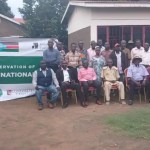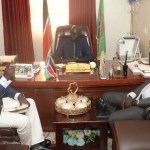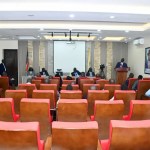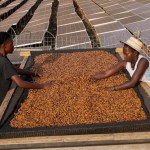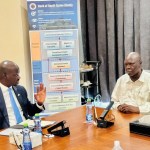(JUBA) – South Sudan’s Transitional National Legislative Assembly has formally adopted President Salva Kiir’s recent address to parliament as a guiding framework for the country’s institutions as it prepares for national elections scheduled for December 2026.
President Kiir’s speech, delivered during the parliamentary opening last month, highlighted peace, reconciliation and national unity as the central pillars of his government’s agenda. He also urged opposition groups still outside the peace process to embrace dialogue and reconciliation in order to secure stability across the country.
Presenting a parliamentary committee report on the matter, Deng Tiel A. Kuur said the president’s call was clear: lawmakers must strengthen their oversight of the executive.
“The president urges the parliament to serve with honour and unity. This call is a challenge to us to live up to our mandate. We must step up our core role of oversight over the executive,” Tiel stated.
He explained that the president placed peace and security at the centre of his priorities, making the speech an important reference for both government institutions and the legislature.
“Peace, security, and national unity remain the top priority. The president has stated firmly that South Sudan will not go back to war,” he added.
Takeaways from President Kiir’s Speech and Parliament’s Adoption
| Priority Area | Details from Kiir’s Speech | Parliament’s Position | Risks/Challenges |
|---|---|---|---|
| Peace and Security | No return to war, all parties must recommit to peace agreement. | Fully adopted as central policy. | Opposition holdouts may resist reconciliation. |
| National Unity | Reconciliation and dialogue seen as essential for elections. | MPs support unity as guiding principle. | Ethnic divisions and mistrust remain high. |
| Parliamentary Oversight | Stronger checks on executive branch. | Accepted; MPs urged to step up oversight role. | Risk of limited implementation or weak follow up. |
| Elections (2026) | Free, fair, and credible polls in December 2026. | Endorsed; parliament commits to supporting process. | Logistical and security concerns ahead of vote. |
| Government Institutions | Ministries to align work with policy priorities. | Seen as roadmap for ministries. | Funding and capacity constraints. |
Lawmakers agreed that the executive should be supported in completing the remaining tasks required to ensure credible elections in 2026.
“To complete the outstanding commitments in time for free, fair and credible elections, parliament shares the president’s goal of all parties recommitting without precondition to the peace agreement,” Tiel said.
Cabinet Affairs Minister Martin Elia Lomuro praised the assembly for formally adopting the speech. He commended the formation of a select committee to study the president’s address, describing its assessment as balanced and useful.
“All of us are called upon to preserve peace and take the country to elections in 2026. It is our collective duty, both individually and politically, to hold elections. Only through elections can we achieve lasting peace by allowing our people to choose their leaders,” Lomuro remarked.
He further stressed that the president’s speech touched on issues relevant to all ministries and institutions of government, providing a roadmap for national priorities.
However, not all voices in the assembly were satisfied with the decision. Nadio Arop Dudi, a representative of the Women’s List in Unity State, cautioned that parliament must go beyond rhetoric. She said continued debates on the speech without concrete action would make the exercise meaningless.
“Parliament must establish mechanisms to ensure the president’s directives are fully implemented,” she urged.










